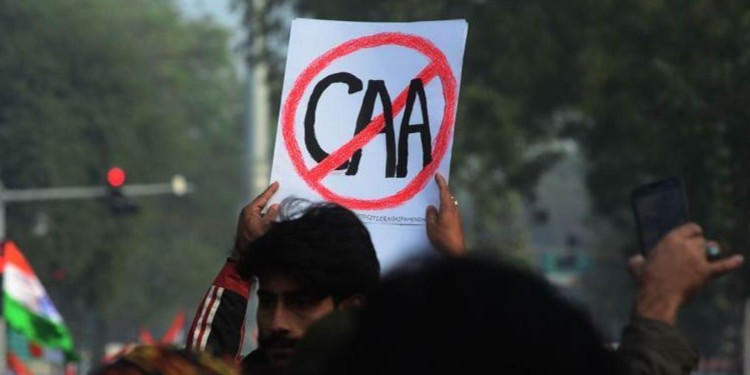In news- The Home Ministry has empowered 13 more District Collectors in five States – Gujarat, Chhattisgarh, Rajasthan, Haryana and Punjab, to grant citizenship certificates to applicants belonging to six minority communities from Pakistan, Bangladesh and Afghanistan.
More information-
- The latest order is a reiteration of similar ones issued in 2016 and 2018.
- It is not related to the Citizenship (Amendment) Act (CAA), 2019 that is yet to come into effect.
- The May 28 notification intends to benefit legal migrants (who entered on passport/visa) from the Hindu, Sikh, Buddhist, Jain, Parsi and Christian communities from the three countries who have already applied for Citizenship under Section 5 (by registration) and Section 6 (naturalisation) of the Citizenship Act, 1955.
- The 13 districts are – Morbi, Rajkot, Patan and Vadodara in Gujarat; Durg and Balodabazar in Chhattisgarh; Jalore, Udaipur, Pali, Barmer and Sirohi in Rajasthan ; Faridabad in Haryana; Jalandhar in Punjab.
- The rules for CAA, 2019 are yet to be framed and a minority applicant from the three countries, even if he/she came in 2014 becomes eligible for citizenship in the year 2025.
- As many have been residing in India for more than 20 years on long-term visas (LTV) the applicants will have to apply online and citizenship certificates will be provided after security checks by Central agencies and State police.
- The UPA government in 2011 first decided to give LTVs to hundreds of Hindus and Sikhs who came to India claiming religious persecution in Pakistan.
- As Citizenship is a Central subject, the Home Ministry periodically delegates powers to States through gazette notification under Section 16 of the Citizenship Act, 1955.
CAA, 2019-
- The bill amended the Citizenship Act, 1955 to provide citizenship to illegal migrants, from Afghanistan, Bangladesh and Pakistan, who are of Hindu, Sikh, Buddhist, Jain, Parsi or Christian extraction.
- An illegal migrant is defined as a foreigner: (i) who enters India without a valid passport or travel documents, or (ii) stays beyond the permitted time. (The definition was inserted in 2004 through an amendment to the Act.)
- The Act applies to those who were “forced or compelled to seek shelter in India due to persecution on the ground of religion” and protects such people from proceedings of illegal migration.
- It reduced the requirement of 11 years of continuous stay in the country to six years to obtain citizenship by naturalisation.
- The cut-off date for citizenship is December 31, 2014, which means the applicant should have entered India on or before that date.
- Section 7 (d) provides for cancellation of Overseas Citizen of India (OCI) registration where the OCI card-holder has violated any provision of the Citizenship Act or any other law in force.
- It has allowed them to take up employment opportunities in non-government sectors and empowered District Magistrates in select States to allow purchase of property and issue of driving licence.
- The Act will not apply to the tribal areas of Assam, Meghalaya, Mizoram, or Tripura, as included in the Sixth Schedule to the Constitution.
It will also not apply to states that have the inner-line permit regime (Arunachal Pradesh, Nagaland and Mizoram) under the Bengal Eastern Frontier Regulation, 1873.














